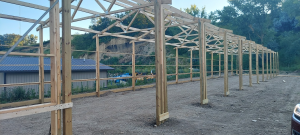Most contractors didn’t become contractors because they love to communicate. If they did they would be like Bob Villa and have their own TV show.
 Sometimes what they say seems completely obvious to them, but makes no sense to you. Of course most of what I say seems completely obvious to me, but makes no sense to my darling bride either.
Sometimes what they say seems completely obvious to them, but makes no sense to you. Of course most of what I say seems completely obvious to me, but makes no sense to my darling bride either.
A contractor might speak euphemistically to dance around difficult topics. These tips should help translate some of the euphemisms and somewhat curt statements you might hear, so the most is gotten out of the client-contractor relationship.
You Hear Nothing. If a contractor doesn’t call back, he’s just not into you. Don’t chase a contractor who’s too busy to return calls, unless you’ve given him money (in this instance, you and your money could be in trouble).
Let’s do it my way instead. No, no, no, no, no. The pole building plans and instructions should be followed explicitly. Just because a contractor has “experience” and has built lots of pole buildings (none of which have fallen down yet), does not give license to go off on a random path.
I’ll get started late next week. Manana. If a contractor sets a start date, he should be able to keep it. But many times several jobs are juggled at once and often unexpected circumstances arise. At best expect them only to come close to their start and completion estimates.
The price is… Unless the scope of work is changed, a contractor won’t expect to negotiate a lump sum price quote. Think the price is too high, get another quote for comparison. While prices vary because of differences in approaching the project or overhead costs, a contractor won’t stay in business unless he prices competitively.
I’ll do my best. There is a good chance a contract will fall short of your expectations. I once took a class on how to write construction contracts. The attorney who taught the class said any builder with a 50% customer satisfaction rate, was doing well!
Generally building owners ask for too much. Have realistic expectations. Should they do a good or even great job? Of course. But if your project is a week behind because it rained every day for 10 days and your building site was a mud hole, it may not have gotten done by the time you had hoped.
There are three elements to any project: The level of quality, the price and the time it takes to complete the project. Pick two of these which are most important, as all three do not happen in concurrence. Need everything perfect by a certain date? Be prepared to pay more.
The design needed some tweaking. Often, this means the builder didn’t follow the plans as they should have. This does not bode well, as in most cases any warrantees are void.
I don’t think this is a good fit. If a contractor declines to quote a project it could be for a lot of reasons. Maybe he has concerns about the budget. You and your contractor will be talking a lot, so maybe he just didn’t think you clicked. It could also be he’s too busy, and he won’t be able to devote enough time to your project to do it right.
We are going to need to do some value engineering. Caviar dreams on a cheese and cracker budget? Be careful when the “value engineering” term gets thrown out. Value engineering is when the team thinks creatively about how to rework the project to lower costs. All to often this results in a substandard finished product.
Let’s walk through and make a punch list. This was my pet peeve as a builder, when clients were unable or willing to provide a one-time complete list.
A contractor wants and deserves to know everything which needs to be done to have a client satisfied with the work. Every trip to the job costs the contractor, so make an effort to come up with a complete punch list —a list of to-do items which need to be completed for the project to be considered complete — instead of sending it bit by bit over time.
As I said, I was a contractor for a good number of years, with 17 crews in 6 states, so I’ve seen both sides of the coin. Make sure you are on the side that gets what you want, for what you expected to pay for it. Or at least close enough both you and the builder are celebrating the completion of your building – together.






